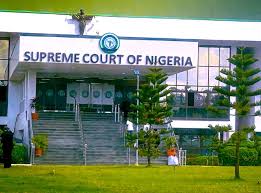Abuja – The Supreme Court of Nigeria has upheld a landmark judgment ordering Fidelity Bank Plc to pay Sagecom Concepts Limited a minimum of $138,842,249 in damages, bringing an end to a legal battle that has spanned nearly two decades.
In a unanimous decision delivered on April 11, 2025, a panel of five justices ruled against Fidelity Bank, affirming the earlier judgments of the Lagos State High Court and the Court of Appeal. The apex court condemned the bank’s conduct in the matter, particularly its disregard for a valid court injunction, describing its actions as an attempt to “benefit from its own wrong.”
The case traces back to 2005, centering on a property located at No. 25 Probyn Road, Ikoyi, Lagos, which comprised ten luxury flats and two penthouses. The property was originally leased by G. Cappa Plc from the now-defunct National Electric Power Authority (NEPA) and subsequently mortgaged to Fidelity Bank as collateral for a $3 million loan. Following G. Cappa’s default on the facility, Fidelity Bank began moves to sell off the mortgaged properties.
This prompted G. Cappa to institute legal action (Suit No. FHC/L/CS/957/2005), leading to a court-ordered interim injunction issued on September 9, 2005, restraining Fidelity Bank from disposing of the property. Despite the subsisting order, the bank, through its agent, Hemaco Commercial Enterprises, sold the Ikoyi property to Sagecom Concepts Limited in November 2005 for N350 million.
Sagecom, having acquired the property in good faith, joined the ongoing suit and filed a counterclaim against both Fidelity Bank and G. Cappa Plc, demanding possession and special damages. While the Federal High Court upheld the validity of the sale, it transferred the counterclaim to the Lagos State High Court for jurisdictional reasons.
The Lagos High Court ruled in Sagecom’s favour, a decision affirmed by the Court of Appeal. The Supreme Court’s judgment now cements those rulings, placing full legal and financial responsibility on Fidelity Bank and G. Cappa Plc.
Justice Adamu Jauro, who read the lead judgment, emphasized that Fidelity Bank had a legal obligation to hand over possession of the property to Sagecom after the transaction was concluded. He further noted that despite a judgment confirming the sale, G. Cappa continued to occupy the property for years, which deprived Sagecom of substantial economic benefits.
Justice Jauro ruled that both Fidelity Bank and G. Cappa were jointly and severally liable for the losses incurred by Sagecom, beginning from June 21, 2011. His position was fully supported by Justice Jummai Hannatu Sankey, who delivered a concurring judgment.
Justice Sankey criticised Fidelity Bank for attempting to escape liability after knowingly violating a court order. “The appellant seeks to benefit from its own wrongdoing,” she stated. “Having admitted to selling the property in contempt of an existing injunction and depriving the rightful buyer of possession for years, the appellant cannot now ask the court to excuse it from the consequences.”
She further stressed that Nigerian law does not tolerate such impunity from corporate entities or individuals, especially when such actions result in significant economic harm to others.
The total amount payable by Fidelity Bank may exceed the stated $138.8 million, as the awarded damages are subject to compound interest at a rate of 19.5% per annum, retroactive from the due dates until the final payment is made.
In its official response, Fidelity Bank acknowledged the Supreme Court judgment but argued that the monetary value, based on the prevailing exchange rate from 2005, amounts to roughly ₦14 billion. The bank noted that it is prepared to honour the judgment but has filed an application seeking the court’s clarification on the proper interpretation and calculation of the total sum.
Meanwhile, the Central Bank of Nigeria (CBN) has intervened to calm public anxiety over the potential implications of the ruling on the financial sector. In a statement signed by the Acting Director of Corporate Communications, Mrs. Hakama Sidi Ali, the CBN assured Nigerians that the nation’s banking sector remains stable and resilient.
The apex bank reaffirmed its commitment to strict oversight of licensed financial institutions and emphasized that it maintains robust regulatory mechanisms to swiftly address any emerging risks.
With this Supreme Court verdict, the prolonged legal conflict surrounding the Ikoyi property appears to have reached its final legal chapter—although the financial implications for Fidelity Bank are still unfolding.
